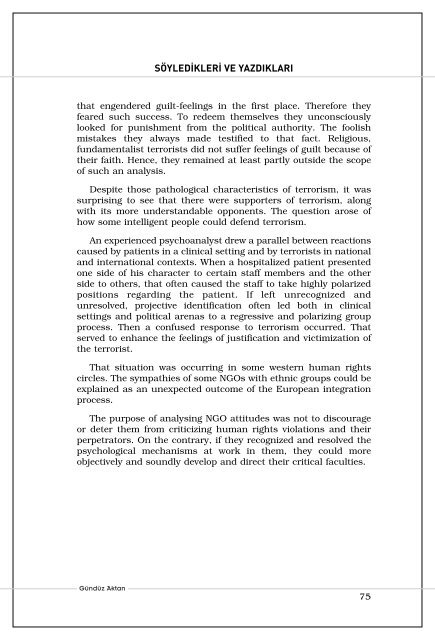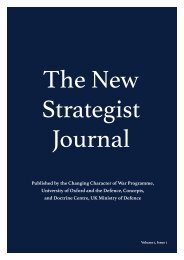- Page 1 and 2:
ANKARA 2012
- Page 3 and 4:
Contents Preface . . . . . . . . .
- Page 5 and 6:
Summary record of the speech delive
- Page 7 and 8:
İçindekiler Önsöz . . . . . . .
- Page 9 and 10:
TERÖRİZM VE İNSAN HAKLARI . . .
- Page 11 and 12:
Preface L ate Gündüz Aktan was a
- Page 13 and 14:
Önsöz O tuz yılı aşkın bir s
- Page 15 and 16:
About Gündüz Aktan Contributors:
- Page 17 and 18:
international changes would be the
- Page 19 and 20:
Armenian Debate and International L
- Page 21 and 22:
Gündüz Aktan Hakkında Katkıda B
- Page 23 and 24: Belirleyici olan ulusal veya ulusla
- Page 25 and 26: Başbakan Özal adına yayınlanan
- Page 27 and 28: Photo Album / Fotoğraf Albümü G
- Page 29 and 30: SÖYLEDİKLERİ VE YAZDIKLARI Günd
- Page 31 and 32: SÖYLEDİKLERİ VE YAZDIKLARI Günd
- Page 33 and 34: SÖYLEDİKLERİ VE YAZDIKLARI Günd
- Page 35 and 36: SÖYLEDİKLERİ VE YAZDIKLARI Günd
- Page 37 and 38: SÖYLEDİKLERİ VE YAZDIKLARI Günd
- Page 39 and 40: SÖYLEDİKLERİ VE YAZDIKLARI Günd
- Page 41 and 42: SÖYLEDİKLERİ VE YAZDIKLARI Günd
- Page 43 and 44: SÖYLEDİKLERİ VE YAZDIKLARI Günd
- Page 45 and 46: SÖYLEDİKLERİ VE YAZDIKLARI Günd
- Page 47: SÖYLEDİKLERİ VE YAZDIKLARI Günd
- Page 51 and 52: SÖYLEDİKLERİ VE YAZDIKLARI Human
- Page 53 and 54: SÖYLEDİKLERİ VE YAZDIKLARI İnsa
- Page 55 and 56: SÖYLEDİKLERİ VE YAZDIKLARI Commi
- Page 57 and 58: SÖYLEDİKLERİ VE YAZDIKLARI The b
- Page 59: SÖYLEDİKLERİ VE YAZDIKLARI deter
- Page 62 and 63: WHAT HE SAID AND WHAT HE WROTE crim
- Page 64 and 65: WHAT HE SAID AND WHAT HE WROTE Like
- Page 66 and 67: WHAT HE SAID AND WHAT HE WROTE The
- Page 68 and 69: WHAT HE SAID AND WHAT HE WROTE righ
- Page 71 and 72: Gündüz AKTAN Commission on Human
- Page 73: SÖYLEDİKLERİ VE YAZDIKLARI There
- Page 78 and 79: WHAT HE SAID AND WHAT HE WROTE a fo
- Page 81 and 82: SÖYLEDİKLERİ VE YAZDIKLARI Commi
- Page 83 and 84: SÖYLEDİKLERİ VE YAZDIKLARI borro
- Page 85 and 86: SÖYLEDİKLERİ VE YAZDIKLARI Sub-C
- Page 87 and 88: SÖYLEDİKLERİ VE YAZDIKLARI by th
- Page 89 and 90: SÖYLEDİKLERİ VE YAZDIKLARI were
- Page 91: SÖYLEDİKLERİ VE YAZDIKLARI envis
- Page 94 and 95: WHAT HE SAID AND WHAT HE WROTE orde
- Page 96 and 97: WHAT HE SAID AND WHAT HE WROTE an o
- Page 99 and 100: Gündüz AKTAN Executive Committee
- Page 101 and 102: SÖYLEDİKLERİ VE YAZDIKLARI forei
- Page 103 and 104: Gündüz AKTAN Commission on Human
- Page 105 and 106: Racism Irkçılık
- Page 107 and 108: SÖYLEDİKLERİ VE YAZDIKLARI Racis
- Page 109 and 110: SÖYLEDİKLERİ VE YAZDIKLARI Irkç
- Page 111 and 112: SÖYLEDİKLERİ VE YAZDIKLARI Commi
- Page 113 and 114: SÖYLEDİKLERİ VE YAZDIKLARI seeke
- Page 115 and 116: Gündüz AKTAN Commission on Human
- Page 117 and 118: SÖYLEDİKLERİ VE YAZDIKLARI Psych
- Page 119 and 120: SÖYLEDİKLERİ VE YAZDIKLARI argum
- Page 121 and 122: SÖYLEDİKLERİ VE YAZDIKLARI dehum
- Page 123 and 124: SÖYLEDİKLERİ VE YAZDIKLARI Until
- Page 125 and 126:
SÖYLEDİKLERİ VE YAZDIKLARI Unlik
- Page 127 and 128:
SÖYLEDİKLERİ VE YAZDIKLARI Natio
- Page 129 and 130:
SÖYLEDİKLERİ VE YAZDIKLARI have
- Page 131 and 132:
SÖYLEDİKLERİ VE YAZDIKLARI has b
- Page 133 and 134:
SÖYLEDİKLERİ VE YAZDIKLARI Commi
- Page 135 and 136:
SÖYLEDİKLERİ VE YAZDIKLARI Commi
- Page 137 and 138:
SÖYLEDİKLERİ VE YAZDIKLARI Commi
- Page 139 and 140:
SÖYLEDİKLERİ VE YAZDIKLARI onto
- Page 141:
Terörizm ve İnsan Hakları Terror
- Page 144 and 145:
WHAT HE SAID AND WHAT HE WROTE Ter
- Page 146 and 147:
WHAT HE SAID AND WHAT HE WROTE own,
- Page 148 and 149:
WHAT HE SAID AND WHAT HE WROTE peop
- Page 150 and 151:
WHAT HE SAID AND WHAT HE WROTE not
- Page 152 and 153:
WHAT HE SAID AND WHAT HE WROTE tort
- Page 154 and 155:
WHAT HE SAID AND WHAT HE WROTE "Kur
- Page 156 and 157:
WHAT HE SAID AND WHAT HE WROTE Comm
- Page 158 and 159:
WHAT HE SAID AND WHAT HE WROTE - Th
- Page 160 and 161:
WHAT HE SAID AND WHAT HE WROTE camp
- Page 162 and 163:
WHAT HE SAID AND WHAT HE WROTE agai
- Page 164 and 165:
WHAT HE SAID AND WHAT HE WROTE Stat
- Page 166 and 167:
166
- Page 168 and 169:
WHAT HE SAID AND WHAT HE WROTE Para
- Page 170 and 171:
WHAT HE SAID AND WHAT HE WROTE Neve
- Page 172 and 173:
172
- Page 175 and 176:
SÖYLEDİKLERİ VE YAZDIKLARI The A
- Page 177 and 178:
Gündüz AKTAN The Legal Approach t
- Page 179 and 180:
SÖYLEDİKLERİ VE YAZDIKLARI provo
- Page 181 and 182:
SÖYLEDİKLERİ VE YAZDIKLARI to re
- Page 183 and 184:
Gündüz AKTAN DEVLETLER HUKUKUNA G
- Page 185 and 186:
SÖYLEDİKLERİ VE YAZDIKLARI yanda
- Page 187 and 188:
SÖYLEDİKLERİ VE YAZDIKLARI karı
- Page 189 and 190:
SÖYLEDİKLERİ VE YAZDIKLARI Karar
- Page 191 and 192:
SÖYLEDİKLERİ VE YAZDIKLARI Bosna
- Page 193 and 194:
SÖYLEDİKLERİ VE YAZDIKLARI yok e
- Page 195 and 196:
SÖYLEDİKLERİ VE YAZDIKLARI kolek
- Page 197 and 198:
SÖYLEDİKLERİ VE YAZDIKLARI Kısm
- Page 199 and 200:
SÖYLEDİKLERİ VE YAZDIKLARI doğr
- Page 201 and 202:
SÖYLEDİKLERİ VE YAZDIKLARI Muş,
- Page 203 and 204:
SÖYLEDİKLERİ VE YAZDIKLARI “mi
- Page 205 and 206:
SÖYLEDİKLERİ VE YAZDIKLARI hizme
- Page 207 and 208:
SÖYLEDİKLERİ VE YAZDIKLARI Müsl
- Page 209 and 210:
SÖYLEDİKLERİ VE YAZDIKLARI Tüm
- Page 211 and 212:
SÖYLEDİKLERİ VE YAZDIKLARI rastl
- Page 213 and 214:
SÖYLEDİKLERİ VE YAZDIKLARI Ermen
- Page 215 and 216:
SÖYLEDİKLERİ VE YAZDIKLARI Proje
- Page 217 and 218:
SÖYLEDİKLERİ VE YAZDIKLARI Mahke
- Page 219 and 220:
SÖYLEDİKLERİ VE YAZDIKLARI Buna
- Page 221 and 222:
SÖYLEDİKLERİ VE YAZDIKLARI bir s
- Page 223 and 224:
SÖYLEDİKLERİ VE YAZDIKLARI homoj
- Page 225 and 226:
SÖYLEDİKLERİ VE YAZDIKLARI Bu ki
- Page 227 and 228:
SÖYLEDİKLERİ VE YAZDIKLARI yapma
- Page 229 and 230:
Gündüz AKTAN THE ARMENIAN PROBLEM
- Page 231 and 232:
SÖYLEDİKLERİ VE YAZDIKLARI When
- Page 233 and 234:
SÖYLEDİKLERİ VE YAZDIKLARI initi
- Page 235 and 236:
SÖYLEDİKLERİ VE YAZDIKLARI and g
- Page 237 and 238:
SÖYLEDİKLERİ VE YAZDIKLARI the C
- Page 239 and 240:
SÖYLEDİKLERİ VE YAZDIKLARI Inten
- Page 241 and 242:
SÖYLEDİKLERİ VE YAZDIKLARI motiv
- Page 243 and 244:
SÖYLEDİKLERİ VE YAZDIKLARI the 1
- Page 245 and 246:
SÖYLEDİKLERİ VE YAZDIKLARI and d
- Page 247 and 248:
SÖYLEDİKLERİ VE YAZDIKLARI confl
- Page 249 and 250:
SÖYLEDİKLERİ VE YAZDIKLARI rose
- Page 251 and 252:
SÖYLEDİKLERİ VE YAZDIKLARI Durin
- Page 253 and 254:
SÖYLEDİKLERİ VE YAZDIKLARI these
- Page 255 and 256:
SÖYLEDİKLERİ VE YAZDIKLARI situa
- Page 257 and 258:
SÖYLEDİKLERİ VE YAZDIKLARI must
- Page 259 and 260:
SÖYLEDİKLERİ VE YAZDIKLARI popul
- Page 261 and 262:
SÖYLEDİKLERİ VE YAZDIKLARI Bogho
- Page 263 and 264:
SÖYLEDİKLERİ VE YAZDIKLARI death
- Page 265 and 266:
SÖYLEDİKLERİ VE YAZDIKLARI Kayse
- Page 267 and 268:
SÖYLEDİKLERİ VE YAZDIKLARI murde
- Page 269 and 270:
SÖYLEDİKLERİ VE YAZDIKLARI same
- Page 271 and 272:
SÖYLEDİKLERİ VE YAZDIKLARI For a
- Page 273 and 274:
SÖYLEDİKLERİ VE YAZDIKLARI the f
- Page 275 and 276:
SÖYLEDİKLERİ VE YAZDIKLARI Semit
- Page 277 and 278:
Gündüz AKTAN Hearing before the S
- Page 279 and 280:
SÖYLEDİKLERİ VE YAZDIKLARI where
- Page 281 and 282:
Son Söz Gündüz Aktan, Diplomasi
- Page 283 and 284:
SÖYLEDİKLERİ VE YAZDIKLARI arkad
- Page 285 and 286:
SÖYLEDİKLERİ VE YAZDIKLARI taraf
- Page 287 and 288:
Epilogue Gündüz Aktan, Diplomacy
- Page 289 and 290:
SÖYLEDİKLERİ VE YAZDIKLARI Europ
- Page 291 and 292:
SÖYLEDİKLERİ VE YAZDIKLARI was h



